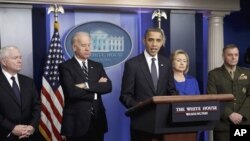In the review of U.S. strategy in Afghanistan and Pakistan he announced on Thursday, President Barack Obama pointed to progress in Afghanistan, and cooperative efforts with neighboring Pakistan, in the fight against al-Qaida and its extremist allies.
In the 24 hours before the formal release of the review, Obama spoke with Afghanistan's President Hamid Karzai and Pakistan's President Asif Ali Zardari about the report's findings and future steps.
Obama said the United States and its partners are "on track" to achieve their goals, and he presented a broad picture for America's military presence in Afghanistan. "We are focused on disrupting, dismantling and defeating al-Qaida in Afghanistan and Pakistan, and preventing its capacity to threaten America and our allies in the future," he said.
The president said the goal is not to defeat "every last threat" to Afghanistan's security or to conduct nation-building. It is up to the people of Afghanistan, he said, to secure their country.
Many of the questions reporters directed at Secretary of State Hillary Clinton, Defense Secretary Robert Gates and military Joints Chiefs of Staff Vice Chairman General James Cartwright had to do with Pakistan.
Pointing to what she called broad military and civilian engagement with Pakistan, Clinton said cooperation has led to "tangible results on the ground." "They moved 140,00 troops off the Indian border. They waged an ongoing conflict against their enemies who happen also to be the allies of our enemies. They began tor recognize what we see as a mortal threat to Pakistan's long-term sovereignty and authority. That was not something that was predicted two years ago that they would do. They have done it," she said.
From the president on down, Clinton said the United States maintains constant communications with a range of Pakistani leaders. She said the U.S. goal is to help Pakistan's government demonstrate that it can deliver results to its people.
One reporter asked whether it is fair to conclude from the review that the initial U.S. troop drawdown President Obama wants to begin next year, based on conditions on the ground, would be modest.
Secretary Gates said the "path out" of major military involvement for the United States and its allies is to stop and reverse Taliban momentum, de-grade Taliban capabilities and deny the group control of major population centers, while building Afghan government capabilities.
He addressed the question of the size and scope of a U.S. drawdown beginning next July. "In terms of what that line looks like, beyond July 2011, I think the answer is we don't know at this point. But the hope is that as we progress that those drawdowns will be able to accelerate," he said.
Gates, Clinton, and Marine Corps General James Cartwright also addressed questions about the effectiveness of the counter-terrorism and counter-insurgency strategy in Afghanistan and Pakistan.
Clinton said counter-terrorism successes are part of the overall effort and cannot be separated when assessing outcomes. General Cartwright said both strategies have and will continue to be important in dealing with the insurgency in Afghanistan and Pakistan. "We have the advantage in Afghanistan of having boots on the ground, so that we can actually defeat rather than just disrupt. We have to get that kind of capability as we look toward Pakistan. That has to be done in partnership with Pakistan. It doesn't mean you have to have American boots on the ground, but you need both," she said.
Cartwright said a key question is whether a counter-insurgency strategy can deliver an enduring peace going forward.
Secretary Gates and Secretary Clinton stressed the degree to which the historic flooding in Pakistan has made things more difficult for the government in Islamabad to respond, and placed pressure on Pakistan's military.
Related report by Ravi Khanna:
Asked how the United States plans to press for more Pakistani cooperation in tribal areas along the border with Afghanistan, Gates said Pakistan has indicated willingness to move into other areas, in addition to south Waziristan and the Swat Valley.
He said Washington has long wanted Pakistan to have a stronger presence on the border, adding that signs point in a positive direction where Pakistan's relationship with the United States is concerned. "The relationship that we have with them and the more confident they are that we have a long-term relationship in mind with Pakistan, then I think the more willing they are going to be to take actions that serve both our interests," he said.
White House Press Secretary Robert Gibbs avoided the question of what the review concludes and President Obama impressions about whether Afghanistan's President Hamid Karzai is a reliable partner.
Pointing to the review's findings, Gibbs described "civilian capacity at a number of different levels" as one of the challenges that needs to be addressed.




